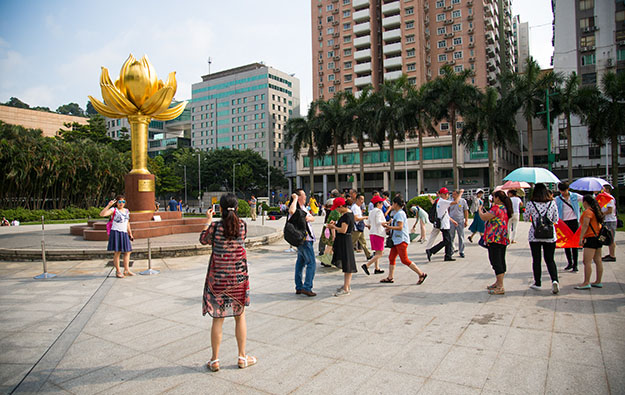HKZM Bridge marks uptick in unlicensed Macau tours: assn
Nov 19, 2018 Newsdesk Latest News, Macau, Top of the deck

The opening of the Hong Kong-Zhuhai-Macau (HKZM) Bridge has seen an uptick in the presence in Macau of mainland Chinese tour groups led by unlicensed tour guides, according to a professional group for Macau tour guides.
“This kind of case got worse after the Hong Kong-Zhuhai-Macau Bridge opened for traffic, as some of the tour trades on the mainland promoted the bridge as part of themed travel packages for their customers to travel to Macau or Hong Kong,” said Chu Meng Ha, president of the Macau Tour Guide Promotion Association, in comments to GGRAsia.
She also claimed that – after passing through one of the Macau boundary crossing points – some such tour groups had been put aboard casino shuttle buses, so that the unlicensed tour leaders could move their customers free of charge to casino resorts either on Macau peninsula or Cotai.
Ms Chu told us: “According to local tourism regulations, you have to employ a locally-licensed tour guide for travelling in the city, and have your itinerary ready for reporting to the Macao Government Tourism Office.”
“…but these [allegedly unlicensed] Chinese guides did not report to the tourism office, nor work with local guides. They are providing unlicensed tour guide services.”
Several local Chinese-language media reports published either on Sunday or Monday also described scenarios of round trips by groups of such mainland Chinese travellers, made between Guangdong, Hong Kong and then Macau – via the bridge, a facility that opened in late October. Such trips were said also often to involve a night spent in Zhuhai, the nearest mainland city to Macau, and where hotel costs are cheaper than the casino hub.
Official group lookalikes
Some such groups then enter Macau via the Border Gate, the main entry point from Zhuhai. The groups with unauthorised leaders are said to have some of the trappings of authorised groups, including caps or jackets of the same design or colour. But their ‘guides’ were not wearing the identity badges required by the Macau tourism bureau, a body also known as MGTO.
When asked by local Chinese reporters, some ‘guides’ reportedly said the ‘group’ members were in fact all “individual travellers”. That was a reference to a different category of tourist from mainland China, where the traveller relies on a different visa, and is not required to be in a group with a chaperone.
“These tour groups did not lease any local tourism coaches to travel around, and instead were just catching a Grand Lisboa-bound casino shuttle to go to San Ma Lou, or heading to the Venetian [Macao casino resort] riding on its shuttles,” the Macau Tour Guide Promotion Association’s Ms Chu told us, referring first to locations on Macau peninsula, and second to one on Cotai.
She added: “They are using the local resources for free, and make the casino shuttles and bus stations in areas like the Border Gate even more crowded during weekends.”
MGTO director Maria Helena de Senna Fernandes was asked on Sunday to comment on the scenarios presented in several local media accounts and alleged by Ms Chu’s group. Ms Senna Fernandes was reported saying her office was “highly concerned” about the matter, and would reinforce inspection at the city’s boundary crossing areas to address any irregularities in tour guide practices.
But Ms Chu told us she was not happy with the MGTO director’s remarks. “For these cases, it requires collaborative efforts with the Chinese tourism authorities to curb these illicit tour guide practices,” she remarked.
“Previously we had a peer tour guide that reported this [allegedly unlicensed] tour to the Macau police…and as soon as this news spread out, we have heard that some mainland travel agents had already ordered their tour groups to take off their travel group jackets and caps, and not to wave any flags after crossing the border [into Macau],” Ms Chu added.
Related articles
-
 Macau regulator probes unlicensed...
Macau regulator probes unlicensed...Jul 24, 2024
-
 Macau average 5-star 1H rate 96pct of...
Macau average 5-star 1H rate 96pct of...Jul 22, 2024
More news
-
 Donaco EBITDA up y-o-y to above US$4mln...
Donaco EBITDA up y-o-y to above US$4mln...Jul 26, 2024
-
 HK listed Palasino upgrades Czech...
HK listed Palasino upgrades Czech...Jul 26, 2024
Latest News
Jul 26, 2024
Border-casino operator Donaco International Ltd has achieved a 164.17-percent year-on-year increase in its latest quarterly group earnings before interest, taxation, depreciation and amortisation...Sign up to our FREE Newsletter
 (Click here for more)
(Click here for more)
Pick of the Day
”We’ve got more traction outside of Macau at the moment. But Macau’s going be a bigger focus for us”
David Punter
Regional representative at Konami Australia
Most Popular
 Sheraton brand to exit Londoner Macao, to be Londoner Grand July 25, 2024
Sheraton brand to exit Londoner Macao, to be Londoner Grand July 25, 2024  Macau regulator probes unlicensed gaming agents July 24, 2024
Macau regulator probes unlicensed gaming agents July 24, 2024  Philippines gives 20k aliens in POGOs 60 days to leave July 25, 2024
Philippines gives 20k aliens in POGOs 60 days to leave July 25, 2024  Philippines-listed DigiPlus says not affected by POGO ban July 24, 2024
Philippines-listed DigiPlus says not affected by POGO ban July 24, 2024  Sands China 2Q EBITDA down q-o-q amid low hold, renovation July 25, 2024
Sands China 2Q EBITDA down q-o-q amid low hold, renovation July 25, 2024






